Family Law: Divorce Cases Analysis and Application
VerifiedAdded on 2020/04/21
|9
|2417
|165
Homework Assignment
AI Summary
This document presents a family law assignment that analyzes two distinct divorce cases under the Women Charter 2009. The first case involves a couple, X and Y, married for seven years, where Y refuses to live with X due to his pet snake. The analysis examines whether X can claim divorce based on the irretrievable breakdown of the marriage, specifically focusing on behavioral grounds, mental illness, and separation periods as defined in the Women Charter. The second case involves H and W, married for 30 years, where growing differences and W's changing behavior, including her involvement in women's rights and radical politics, lead H to seek a divorce. The analysis evaluates H's claim under the charter, emphasizing behavioral grounds, the objective test of reasonable cohabitation, and the potential impact of W's mother's inheritance stipulations. The document applies legal principles, including the provisions for irretrievable breakdown, behavioral misconduct, and separation periods, while considering the conduct of the parties and potential hardships, to determine the likely outcomes of the divorce claims.
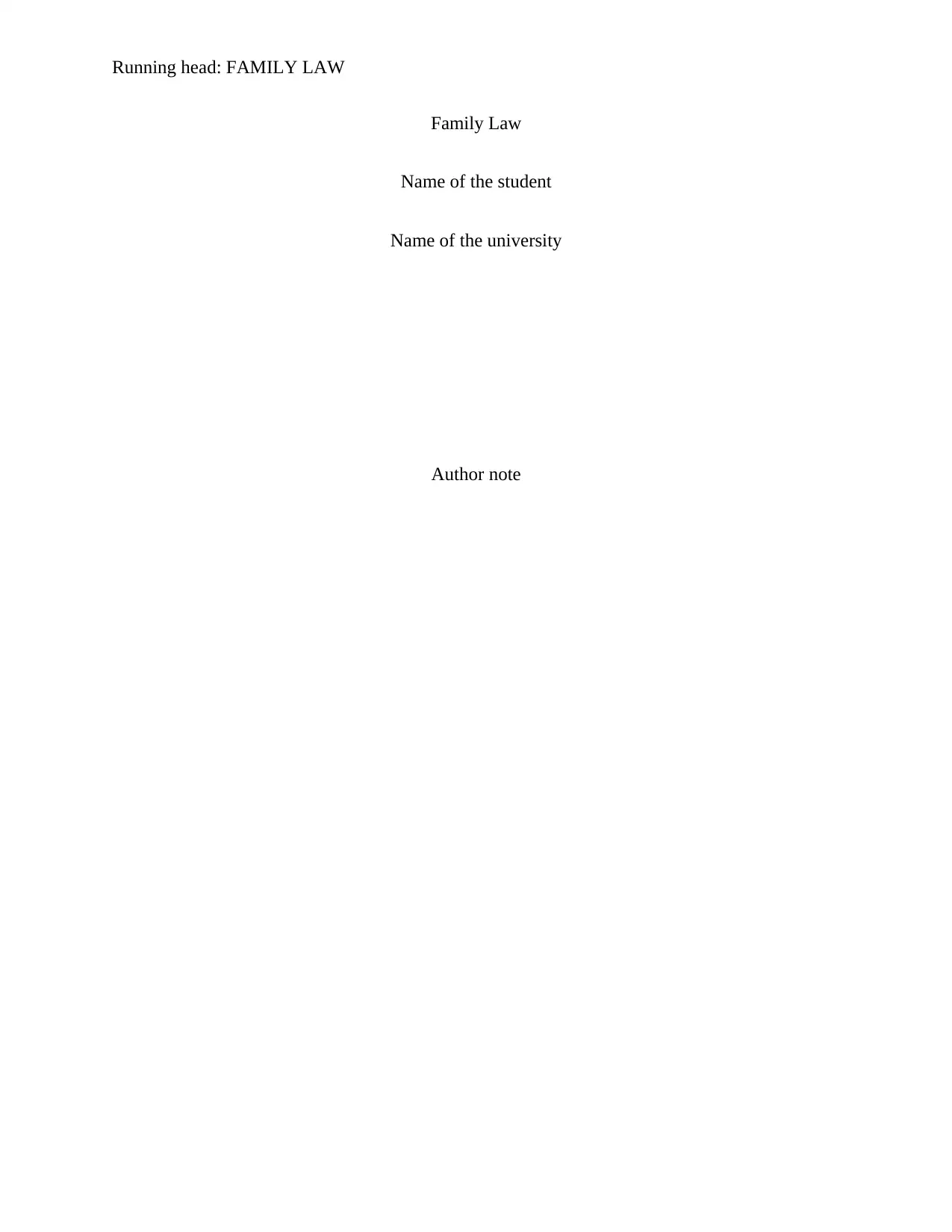
Running head: FAMILY LAW
Family Law
Name of the student
Name of the university
Author note
Family Law
Name of the student
Name of the university
Author note
Paraphrase This Document
Need a fresh take? Get an instant paraphrase of this document with our AI Paraphraser
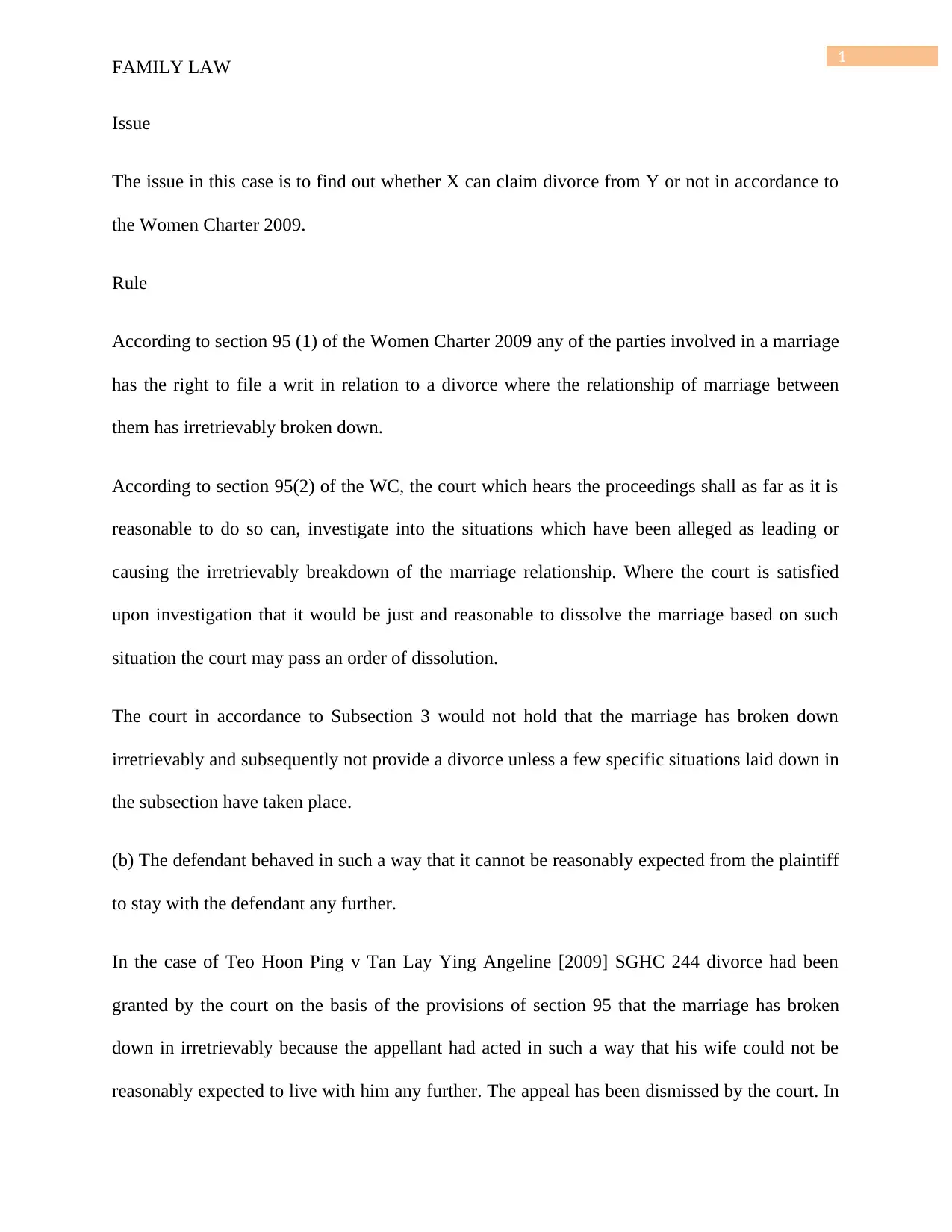
1
FAMILY LAW
Issue
The issue in this case is to find out whether X can claim divorce from Y or not in accordance to
the Women Charter 2009.
Rule
According to section 95 (1) of the Women Charter 2009 any of the parties involved in a marriage
has the right to file a writ in relation to a divorce where the relationship of marriage between
them has irretrievably broken down.
According to section 95(2) of the WC, the court which hears the proceedings shall as far as it is
reasonable to do so can, investigate into the situations which have been alleged as leading or
causing the irretrievably breakdown of the marriage relationship. Where the court is satisfied
upon investigation that it would be just and reasonable to dissolve the marriage based on such
situation the court may pass an order of dissolution.
The court in accordance to Subsection 3 would not hold that the marriage has broken down
irretrievably and subsequently not provide a divorce unless a few specific situations laid down in
the subsection have taken place.
(b) The defendant behaved in such a way that it cannot be reasonably expected from the plaintiff
to stay with the defendant any further.
In the case of Teo Hoon Ping v Tan Lay Ying Angeline [2009] SGHC 244 divorce had been
granted by the court on the basis of the provisions of section 95 that the marriage has broken
down in irretrievably because the appellant had acted in such a way that his wife could not be
reasonably expected to live with him any further. The appeal has been dismissed by the court. In
FAMILY LAW
Issue
The issue in this case is to find out whether X can claim divorce from Y or not in accordance to
the Women Charter 2009.
Rule
According to section 95 (1) of the Women Charter 2009 any of the parties involved in a marriage
has the right to file a writ in relation to a divorce where the relationship of marriage between
them has irretrievably broken down.
According to section 95(2) of the WC, the court which hears the proceedings shall as far as it is
reasonable to do so can, investigate into the situations which have been alleged as leading or
causing the irretrievably breakdown of the marriage relationship. Where the court is satisfied
upon investigation that it would be just and reasonable to dissolve the marriage based on such
situation the court may pass an order of dissolution.
The court in accordance to Subsection 3 would not hold that the marriage has broken down
irretrievably and subsequently not provide a divorce unless a few specific situations laid down in
the subsection have taken place.
(b) The defendant behaved in such a way that it cannot be reasonably expected from the plaintiff
to stay with the defendant any further.
In the case of Teo Hoon Ping v Tan Lay Ying Angeline [2009] SGHC 244 divorce had been
granted by the court on the basis of the provisions of section 95 that the marriage has broken
down in irretrievably because the appellant had acted in such a way that his wife could not be
reasonably expected to live with him any further. The appeal has been dismissed by the court. In
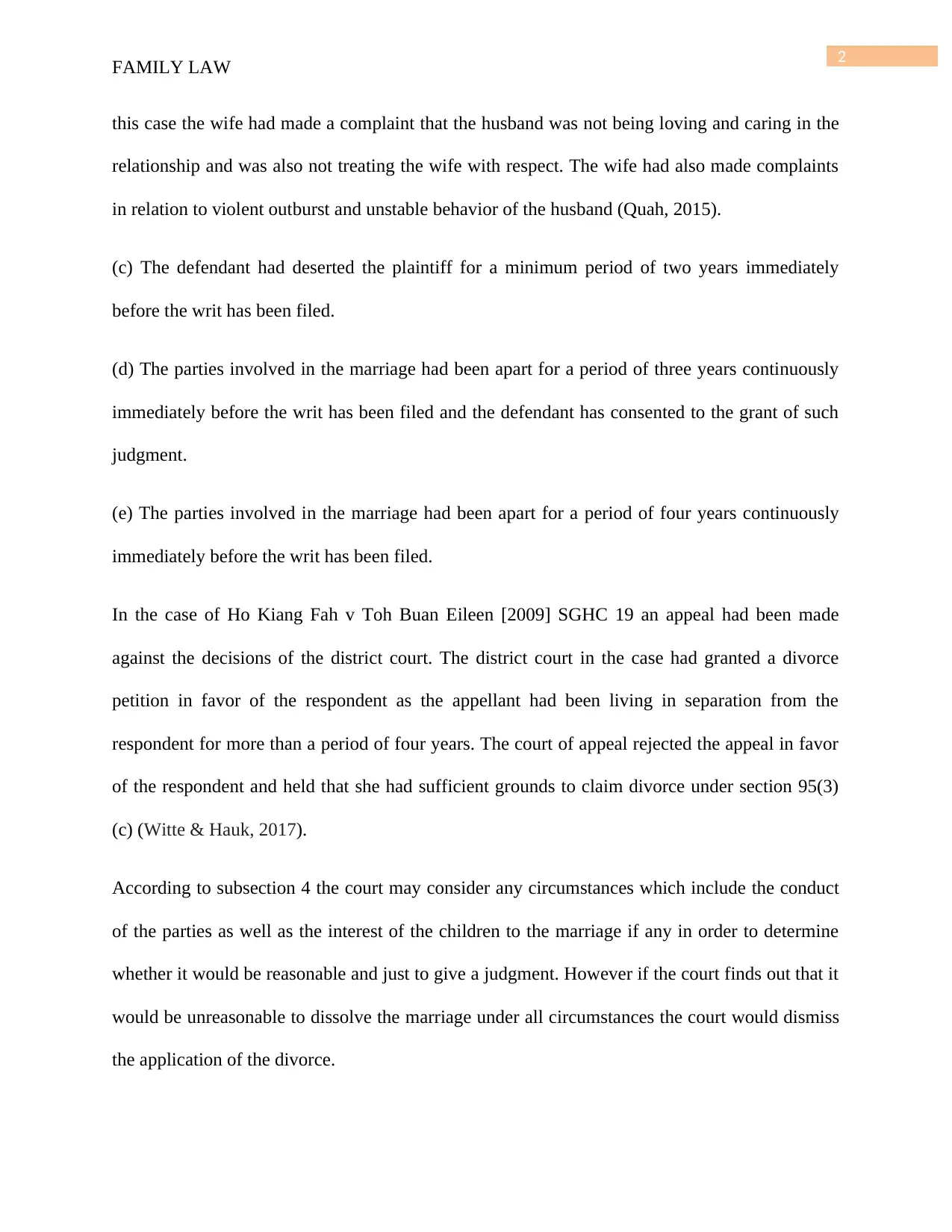
2
FAMILY LAW
this case the wife had made a complaint that the husband was not being loving and caring in the
relationship and was also not treating the wife with respect. The wife had also made complaints
in relation to violent outburst and unstable behavior of the husband (Quah, 2015).
(c) The defendant had deserted the plaintiff for a minimum period of two years immediately
before the writ has been filed.
(d) The parties involved in the marriage had been apart for a period of three years continuously
immediately before the writ has been filed and the defendant has consented to the grant of such
judgment.
(e) The parties involved in the marriage had been apart for a period of four years continuously
immediately before the writ has been filed.
In the case of Ho Kiang Fah v Toh Buan Eileen [2009] SGHC 19 an appeal had been made
against the decisions of the district court. The district court in the case had granted a divorce
petition in favor of the respondent as the appellant had been living in separation from the
respondent for more than a period of four years. The court of appeal rejected the appeal in favor
of the respondent and held that she had sufficient grounds to claim divorce under section 95(3)
(c) (Witte & Hauk, 2017).
According to subsection 4 the court may consider any circumstances which include the conduct
of the parties as well as the interest of the children to the marriage if any in order to determine
whether it would be reasonable and just to give a judgment. However if the court finds out that it
would be unreasonable to dissolve the marriage under all circumstances the court would dismiss
the application of the divorce.
FAMILY LAW
this case the wife had made a complaint that the husband was not being loving and caring in the
relationship and was also not treating the wife with respect. The wife had also made complaints
in relation to violent outburst and unstable behavior of the husband (Quah, 2015).
(c) The defendant had deserted the plaintiff for a minimum period of two years immediately
before the writ has been filed.
(d) The parties involved in the marriage had been apart for a period of three years continuously
immediately before the writ has been filed and the defendant has consented to the grant of such
judgment.
(e) The parties involved in the marriage had been apart for a period of four years continuously
immediately before the writ has been filed.
In the case of Ho Kiang Fah v Toh Buan Eileen [2009] SGHC 19 an appeal had been made
against the decisions of the district court. The district court in the case had granted a divorce
petition in favor of the respondent as the appellant had been living in separation from the
respondent for more than a period of four years. The court of appeal rejected the appeal in favor
of the respondent and held that she had sufficient grounds to claim divorce under section 95(3)
(c) (Witte & Hauk, 2017).
According to subsection 4 the court may consider any circumstances which include the conduct
of the parties as well as the interest of the children to the marriage if any in order to determine
whether it would be reasonable and just to give a judgment. However if the court finds out that it
would be unreasonable to dissolve the marriage under all circumstances the court would dismiss
the application of the divorce.
⊘ This is a preview!⊘
Do you want full access?
Subscribe today to unlock all pages.

Trusted by 1+ million students worldwide
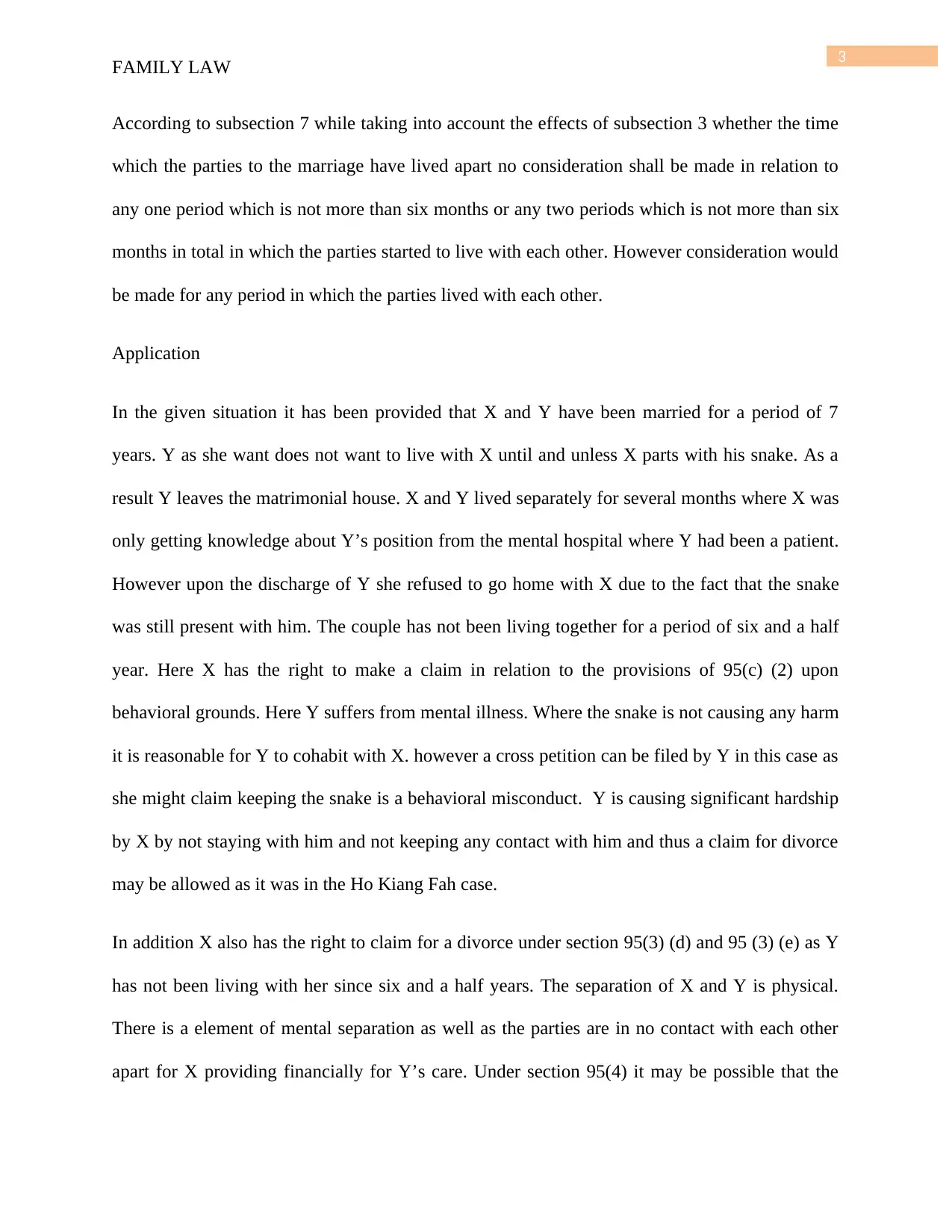
3
FAMILY LAW
According to subsection 7 while taking into account the effects of subsection 3 whether the time
which the parties to the marriage have lived apart no consideration shall be made in relation to
any one period which is not more than six months or any two periods which is not more than six
months in total in which the parties started to live with each other. However consideration would
be made for any period in which the parties lived with each other.
Application
In the given situation it has been provided that X and Y have been married for a period of 7
years. Y as she want does not want to live with X until and unless X parts with his snake. As a
result Y leaves the matrimonial house. X and Y lived separately for several months where X was
only getting knowledge about Y’s position from the mental hospital where Y had been a patient.
However upon the discharge of Y she refused to go home with X due to the fact that the snake
was still present with him. The couple has not been living together for a period of six and a half
year. Here X has the right to make a claim in relation to the provisions of 95(c) (2) upon
behavioral grounds. Here Y suffers from mental illness. Where the snake is not causing any harm
it is reasonable for Y to cohabit with X. however a cross petition can be filed by Y in this case as
she might claim keeping the snake is a behavioral misconduct. Y is causing significant hardship
by X by not staying with him and not keeping any contact with him and thus a claim for divorce
may be allowed as it was in the Ho Kiang Fah case.
In addition X also has the right to claim for a divorce under section 95(3) (d) and 95 (3) (e) as Y
has not been living with her since six and a half years. The separation of X and Y is physical.
There is a element of mental separation as well as the parties are in no contact with each other
apart for X providing financially for Y’s care. Under section 95(4) it may be possible that the
FAMILY LAW
According to subsection 7 while taking into account the effects of subsection 3 whether the time
which the parties to the marriage have lived apart no consideration shall be made in relation to
any one period which is not more than six months or any two periods which is not more than six
months in total in which the parties started to live with each other. However consideration would
be made for any period in which the parties lived with each other.
Application
In the given situation it has been provided that X and Y have been married for a period of 7
years. Y as she want does not want to live with X until and unless X parts with his snake. As a
result Y leaves the matrimonial house. X and Y lived separately for several months where X was
only getting knowledge about Y’s position from the mental hospital where Y had been a patient.
However upon the discharge of Y she refused to go home with X due to the fact that the snake
was still present with him. The couple has not been living together for a period of six and a half
year. Here X has the right to make a claim in relation to the provisions of 95(c) (2) upon
behavioral grounds. Here Y suffers from mental illness. Where the snake is not causing any harm
it is reasonable for Y to cohabit with X. however a cross petition can be filed by Y in this case as
she might claim keeping the snake is a behavioral misconduct. Y is causing significant hardship
by X by not staying with him and not keeping any contact with him and thus a claim for divorce
may be allowed as it was in the Ho Kiang Fah case.
In addition X also has the right to claim for a divorce under section 95(3) (d) and 95 (3) (e) as Y
has not been living with her since six and a half years. The separation of X and Y is physical.
There is a element of mental separation as well as the parties are in no contact with each other
apart for X providing financially for Y’s care. Under section 95(4) it may be possible that the
Paraphrase This Document
Need a fresh take? Get an instant paraphrase of this document with our AI Paraphraser
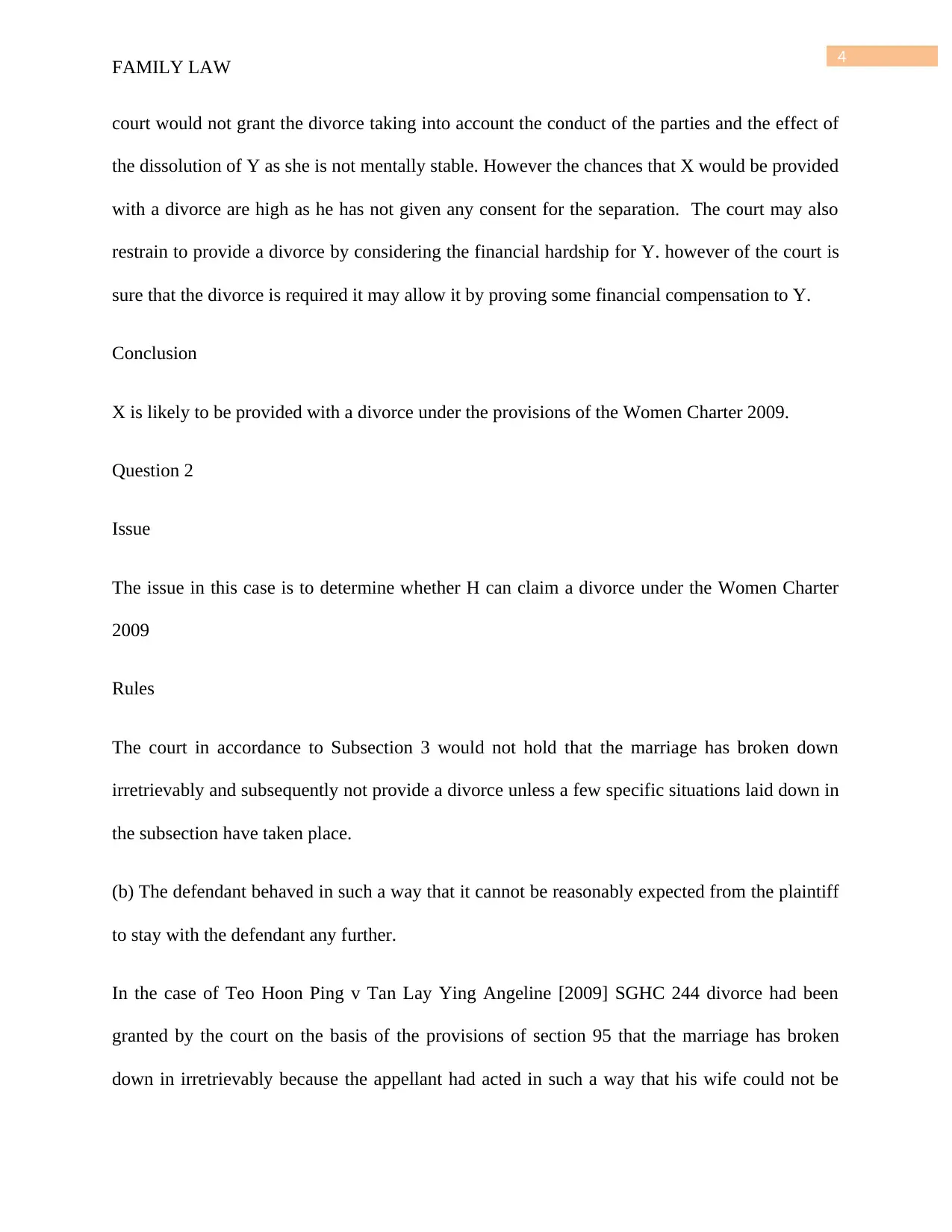
4
FAMILY LAW
court would not grant the divorce taking into account the conduct of the parties and the effect of
the dissolution of Y as she is not mentally stable. However the chances that X would be provided
with a divorce are high as he has not given any consent for the separation. The court may also
restrain to provide a divorce by considering the financial hardship for Y. however of the court is
sure that the divorce is required it may allow it by proving some financial compensation to Y.
Conclusion
X is likely to be provided with a divorce under the provisions of the Women Charter 2009.
Question 2
Issue
The issue in this case is to determine whether H can claim a divorce under the Women Charter
2009
Rules
The court in accordance to Subsection 3 would not hold that the marriage has broken down
irretrievably and subsequently not provide a divorce unless a few specific situations laid down in
the subsection have taken place.
(b) The defendant behaved in such a way that it cannot be reasonably expected from the plaintiff
to stay with the defendant any further.
In the case of Teo Hoon Ping v Tan Lay Ying Angeline [2009] SGHC 244 divorce had been
granted by the court on the basis of the provisions of section 95 that the marriage has broken
down in irretrievably because the appellant had acted in such a way that his wife could not be
FAMILY LAW
court would not grant the divorce taking into account the conduct of the parties and the effect of
the dissolution of Y as she is not mentally stable. However the chances that X would be provided
with a divorce are high as he has not given any consent for the separation. The court may also
restrain to provide a divorce by considering the financial hardship for Y. however of the court is
sure that the divorce is required it may allow it by proving some financial compensation to Y.
Conclusion
X is likely to be provided with a divorce under the provisions of the Women Charter 2009.
Question 2
Issue
The issue in this case is to determine whether H can claim a divorce under the Women Charter
2009
Rules
The court in accordance to Subsection 3 would not hold that the marriage has broken down
irretrievably and subsequently not provide a divorce unless a few specific situations laid down in
the subsection have taken place.
(b) The defendant behaved in such a way that it cannot be reasonably expected from the plaintiff
to stay with the defendant any further.
In the case of Teo Hoon Ping v Tan Lay Ying Angeline [2009] SGHC 244 divorce had been
granted by the court on the basis of the provisions of section 95 that the marriage has broken
down in irretrievably because the appellant had acted in such a way that his wife could not be
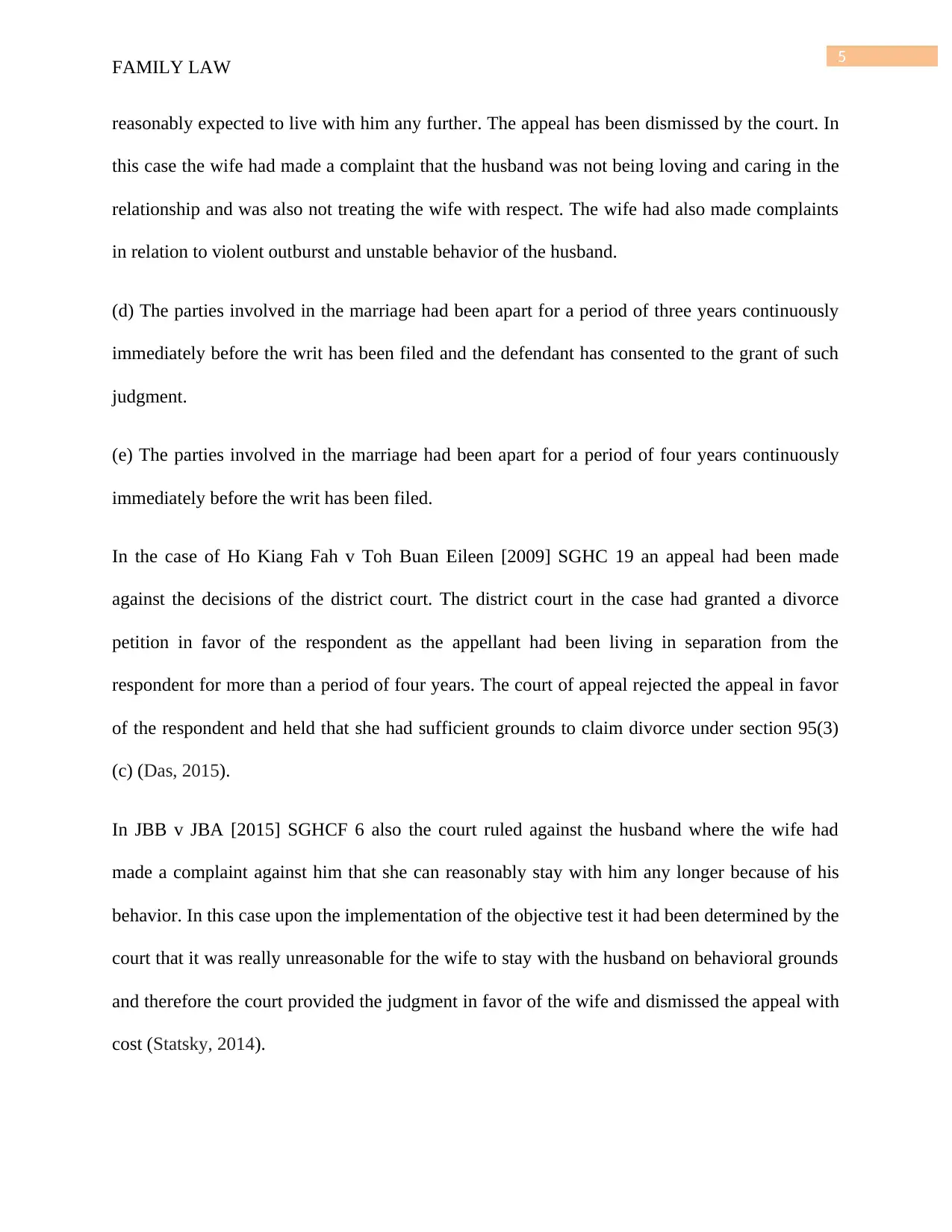
5
FAMILY LAW
reasonably expected to live with him any further. The appeal has been dismissed by the court. In
this case the wife had made a complaint that the husband was not being loving and caring in the
relationship and was also not treating the wife with respect. The wife had also made complaints
in relation to violent outburst and unstable behavior of the husband.
(d) The parties involved in the marriage had been apart for a period of three years continuously
immediately before the writ has been filed and the defendant has consented to the grant of such
judgment.
(e) The parties involved in the marriage had been apart for a period of four years continuously
immediately before the writ has been filed.
In the case of Ho Kiang Fah v Toh Buan Eileen [2009] SGHC 19 an appeal had been made
against the decisions of the district court. The district court in the case had granted a divorce
petition in favor of the respondent as the appellant had been living in separation from the
respondent for more than a period of four years. The court of appeal rejected the appeal in favor
of the respondent and held that she had sufficient grounds to claim divorce under section 95(3)
(c) (Das, 2015).
In JBB v JBA [2015] SGHCF 6 also the court ruled against the husband where the wife had
made a complaint against him that she can reasonably stay with him any longer because of his
behavior. In this case upon the implementation of the objective test it had been determined by the
court that it was really unreasonable for the wife to stay with the husband on behavioral grounds
and therefore the court provided the judgment in favor of the wife and dismissed the appeal with
cost (Statsky, 2014).
FAMILY LAW
reasonably expected to live with him any further. The appeal has been dismissed by the court. In
this case the wife had made a complaint that the husband was not being loving and caring in the
relationship and was also not treating the wife with respect. The wife had also made complaints
in relation to violent outburst and unstable behavior of the husband.
(d) The parties involved in the marriage had been apart for a period of three years continuously
immediately before the writ has been filed and the defendant has consented to the grant of such
judgment.
(e) The parties involved in the marriage had been apart for a period of four years continuously
immediately before the writ has been filed.
In the case of Ho Kiang Fah v Toh Buan Eileen [2009] SGHC 19 an appeal had been made
against the decisions of the district court. The district court in the case had granted a divorce
petition in favor of the respondent as the appellant had been living in separation from the
respondent for more than a period of four years. The court of appeal rejected the appeal in favor
of the respondent and held that she had sufficient grounds to claim divorce under section 95(3)
(c) (Das, 2015).
In JBB v JBA [2015] SGHCF 6 also the court ruled against the husband where the wife had
made a complaint against him that she can reasonably stay with him any longer because of his
behavior. In this case upon the implementation of the objective test it had been determined by the
court that it was really unreasonable for the wife to stay with the husband on behavioral grounds
and therefore the court provided the judgment in favor of the wife and dismissed the appeal with
cost (Statsky, 2014).
⊘ This is a preview!⊘
Do you want full access?
Subscribe today to unlock all pages.

Trusted by 1+ million students worldwide
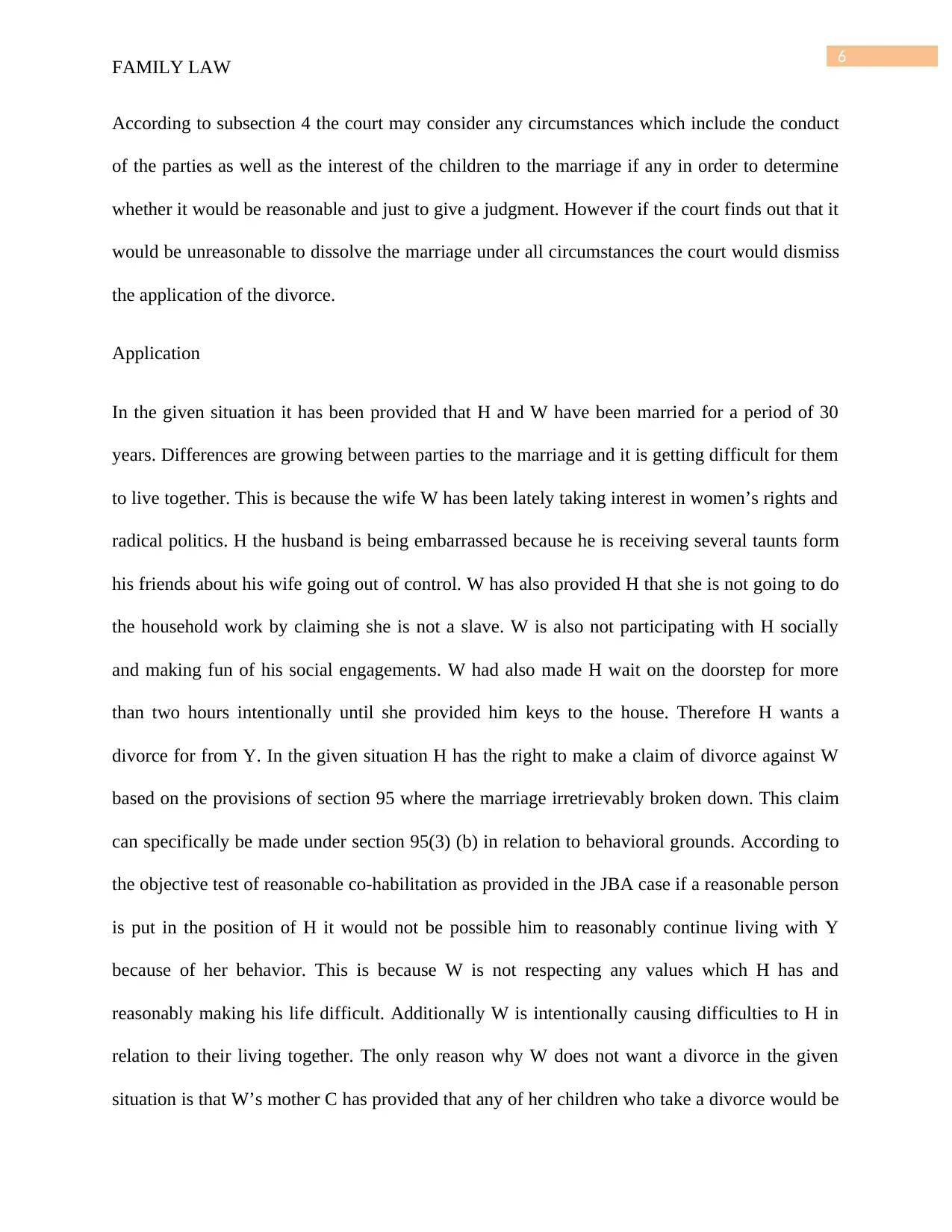
6
FAMILY LAW
According to subsection 4 the court may consider any circumstances which include the conduct
of the parties as well as the interest of the children to the marriage if any in order to determine
whether it would be reasonable and just to give a judgment. However if the court finds out that it
would be unreasonable to dissolve the marriage under all circumstances the court would dismiss
the application of the divorce.
Application
In the given situation it has been provided that H and W have been married for a period of 30
years. Differences are growing between parties to the marriage and it is getting difficult for them
to live together. This is because the wife W has been lately taking interest in women’s rights and
radical politics. H the husband is being embarrassed because he is receiving several taunts form
his friends about his wife going out of control. W has also provided H that she is not going to do
the household work by claiming she is not a slave. W is also not participating with H socially
and making fun of his social engagements. W had also made H wait on the doorstep for more
than two hours intentionally until she provided him keys to the house. Therefore H wants a
divorce for from Y. In the given situation H has the right to make a claim of divorce against W
based on the provisions of section 95 where the marriage irretrievably broken down. This claim
can specifically be made under section 95(3) (b) in relation to behavioral grounds. According to
the objective test of reasonable co-habilitation as provided in the JBA case if a reasonable person
is put in the position of H it would not be possible him to reasonably continue living with Y
because of her behavior. This is because W is not respecting any values which H has and
reasonably making his life difficult. Additionally W is intentionally causing difficulties to H in
relation to their living together. The only reason why W does not want a divorce in the given
situation is that W’s mother C has provided that any of her children who take a divorce would be
FAMILY LAW
According to subsection 4 the court may consider any circumstances which include the conduct
of the parties as well as the interest of the children to the marriage if any in order to determine
whether it would be reasonable and just to give a judgment. However if the court finds out that it
would be unreasonable to dissolve the marriage under all circumstances the court would dismiss
the application of the divorce.
Application
In the given situation it has been provided that H and W have been married for a period of 30
years. Differences are growing between parties to the marriage and it is getting difficult for them
to live together. This is because the wife W has been lately taking interest in women’s rights and
radical politics. H the husband is being embarrassed because he is receiving several taunts form
his friends about his wife going out of control. W has also provided H that she is not going to do
the household work by claiming she is not a slave. W is also not participating with H socially
and making fun of his social engagements. W had also made H wait on the doorstep for more
than two hours intentionally until she provided him keys to the house. Therefore H wants a
divorce for from Y. In the given situation H has the right to make a claim of divorce against W
based on the provisions of section 95 where the marriage irretrievably broken down. This claim
can specifically be made under section 95(3) (b) in relation to behavioral grounds. According to
the objective test of reasonable co-habilitation as provided in the JBA case if a reasonable person
is put in the position of H it would not be possible him to reasonably continue living with Y
because of her behavior. This is because W is not respecting any values which H has and
reasonably making his life difficult. Additionally W is intentionally causing difficulties to H in
relation to their living together. The only reason why W does not want a divorce in the given
situation is that W’s mother C has provided that any of her children who take a divorce would be
Paraphrase This Document
Need a fresh take? Get an instant paraphrase of this document with our AI Paraphraser
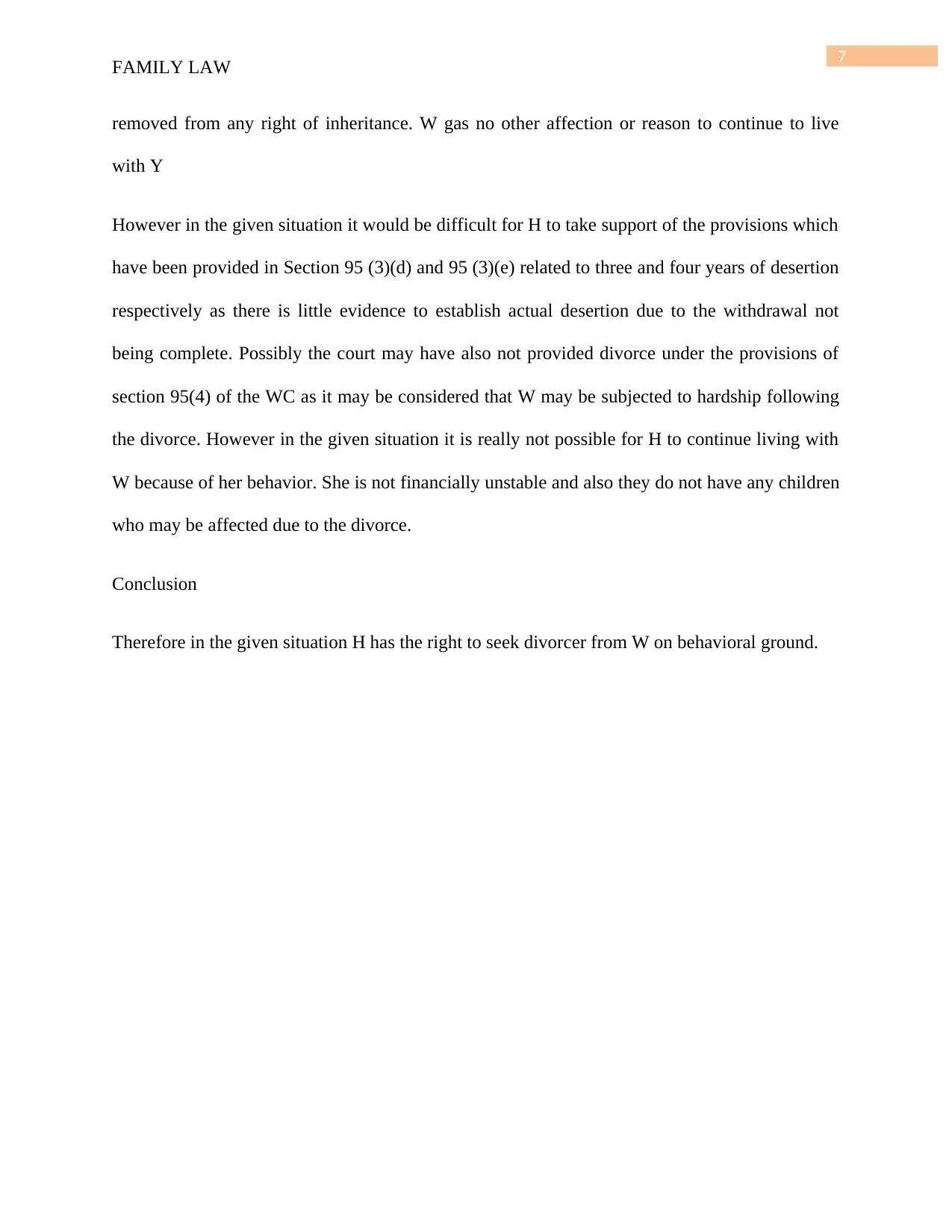
7
FAMILY LAW
removed from any right of inheritance. W gas no other affection or reason to continue to live
with Y
However in the given situation it would be difficult for H to take support of the provisions which
have been provided in Section 95 (3)(d) and 95 (3)(e) related to three and four years of desertion
respectively as there is little evidence to establish actual desertion due to the withdrawal not
being complete. Possibly the court may have also not provided divorce under the provisions of
section 95(4) of the WC as it may be considered that W may be subjected to hardship following
the divorce. However in the given situation it is really not possible for H to continue living with
W because of her behavior. She is not financially unstable and also they do not have any children
who may be affected due to the divorce.
Conclusion
Therefore in the given situation H has the right to seek divorcer from W on behavioral ground.
FAMILY LAW
removed from any right of inheritance. W gas no other affection or reason to continue to live
with Y
However in the given situation it would be difficult for H to take support of the provisions which
have been provided in Section 95 (3)(d) and 95 (3)(e) related to three and four years of desertion
respectively as there is little evidence to establish actual desertion due to the withdrawal not
being complete. Possibly the court may have also not provided divorce under the provisions of
section 95(4) of the WC as it may be considered that W may be subjected to hardship following
the divorce. However in the given situation it is really not possible for H to continue living with
W because of her behavior. She is not financially unstable and also they do not have any children
who may be affected due to the divorce.
Conclusion
Therefore in the given situation H has the right to seek divorcer from W on behavioral ground.
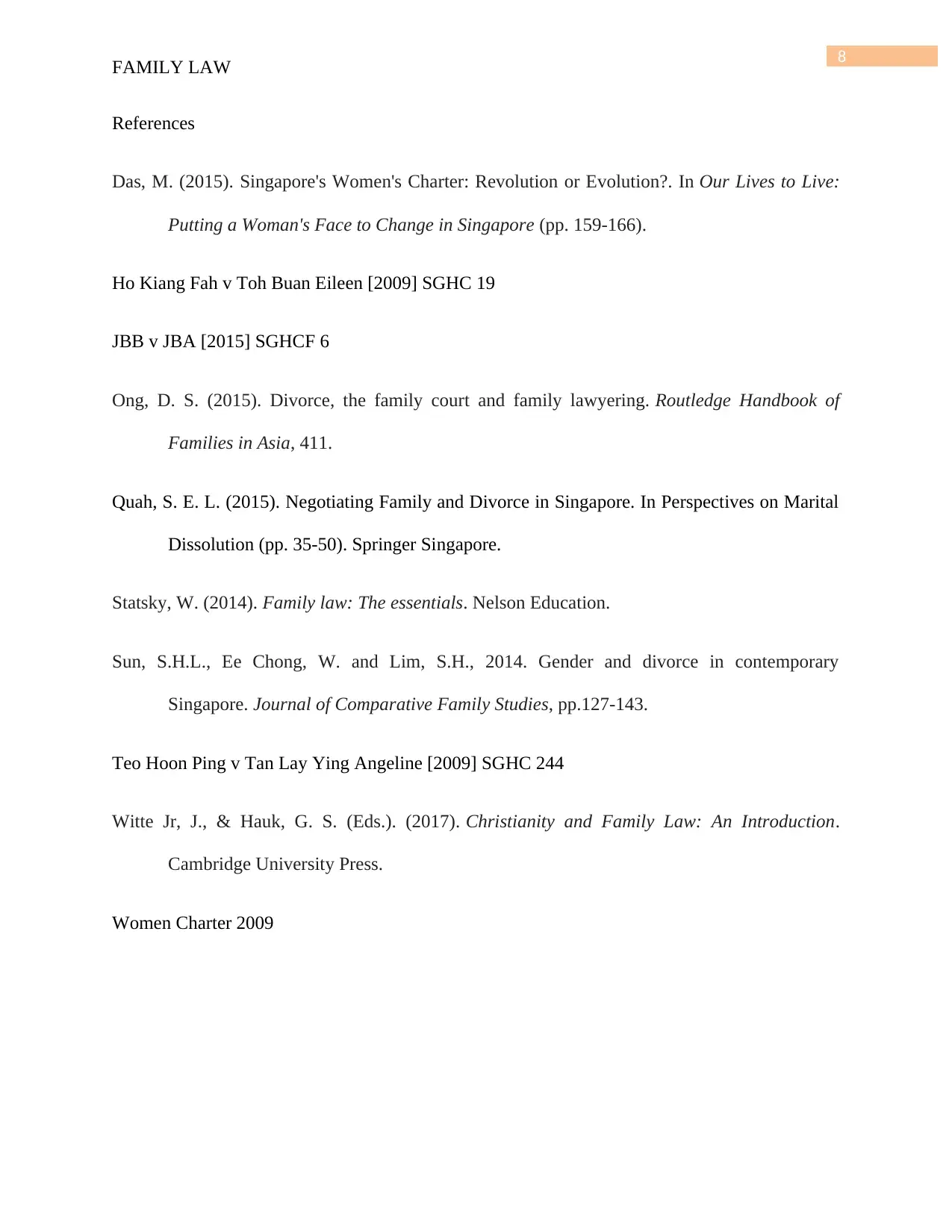
8
FAMILY LAW
References
Das, M. (2015). Singapore's Women's Charter: Revolution or Evolution?. In Our Lives to Live:
Putting a Woman's Face to Change in Singapore (pp. 159-166).
Ho Kiang Fah v Toh Buan Eileen [2009] SGHC 19
JBB v JBA [2015] SGHCF 6
Ong, D. S. (2015). Divorce, the family court and family lawyering. Routledge Handbook of
Families in Asia, 411.
Quah, S. E. L. (2015). Negotiating Family and Divorce in Singapore. In Perspectives on Marital
Dissolution (pp. 35-50). Springer Singapore.
Statsky, W. (2014). Family law: The essentials. Nelson Education.
Sun, S.H.L., Ee Chong, W. and Lim, S.H., 2014. Gender and divorce in contemporary
Singapore. Journal of Comparative Family Studies, pp.127-143.
Teo Hoon Ping v Tan Lay Ying Angeline [2009] SGHC 244
Witte Jr, J., & Hauk, G. S. (Eds.). (2017). Christianity and Family Law: An Introduction.
Cambridge University Press.
Women Charter 2009
FAMILY LAW
References
Das, M. (2015). Singapore's Women's Charter: Revolution or Evolution?. In Our Lives to Live:
Putting a Woman's Face to Change in Singapore (pp. 159-166).
Ho Kiang Fah v Toh Buan Eileen [2009] SGHC 19
JBB v JBA [2015] SGHCF 6
Ong, D. S. (2015). Divorce, the family court and family lawyering. Routledge Handbook of
Families in Asia, 411.
Quah, S. E. L. (2015). Negotiating Family and Divorce in Singapore. In Perspectives on Marital
Dissolution (pp. 35-50). Springer Singapore.
Statsky, W. (2014). Family law: The essentials. Nelson Education.
Sun, S.H.L., Ee Chong, W. and Lim, S.H., 2014. Gender and divorce in contemporary
Singapore. Journal of Comparative Family Studies, pp.127-143.
Teo Hoon Ping v Tan Lay Ying Angeline [2009] SGHC 244
Witte Jr, J., & Hauk, G. S. (Eds.). (2017). Christianity and Family Law: An Introduction.
Cambridge University Press.
Women Charter 2009
⊘ This is a preview!⊘
Do you want full access?
Subscribe today to unlock all pages.

Trusted by 1+ million students worldwide
1 out of 9
Related Documents
Your All-in-One AI-Powered Toolkit for Academic Success.
+13062052269
info@desklib.com
Available 24*7 on WhatsApp / Email
![[object Object]](/_next/static/media/star-bottom.7253800d.svg)
Unlock your academic potential
Copyright © 2020–2026 A2Z Services. All Rights Reserved. Developed and managed by ZUCOL.


